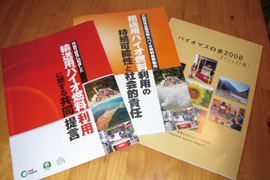The Mitsui & Co. Environment Fund
Introduction to Grant Projects
Biomass Industry & Society Network
Studies and educational activities pertaining to the building of frameworks related to the sustainability of bio fuel in the Asian region
Activity grant
- Project Description
Although bio fuel has been recognized as a great weapon in the battle to reduce greenhouse gases, and Japan too has set a target of introducing 5 million kilolitres by 2010, there are still misgivings concerning the competition that it poses to the growing of food and its effect on soil, forests, and ecosystems. As sufficient data gathering and investigative research, including field surveys and environmental impact assessments, are essential in order to get an indication of what would constitute as a sustainable use of bio fuels, this research aims to investigate and analyze literary sources, investigate the effects of increased demand on the countries of production, consider the arguments being raised overseas, and hold symposiums to help drive sustainable bio fuel use.
- Fields
- Climate changeMarine resources/foodPreservation of surface soil and forestsEnergy problemPreservation of biodiversity and ecosystem
- Grant year
- FY2007 Activity Grants
- Grant term
- 1 year
April 2008 - March 2009
- Grant amount
- 4,500,000 yen
- Activity region
- Within Japan, Indonesia and Malaysia

Overview of the Organization

- Representative
- Miyuki Tomari (Nakamura), Chairperson
- Established
- 1999
- Establishment Purpose
- To promote an economically, environmentally, and socially sustainable use of biomass for energy and industry, as we look towards building a zero-waste society.
- Main areas of activity
- Mainly within Japan
- Staff
- 1 full-time staff member, 3 part-time staff members, 500 full members
- Annual operating budget
- 149.88 million yen in 2005, 129.35 million yen in 2006, 7.83 million yen in 2007
- WEB site
- http://www.npobin.net/
- Recent activities
- Activities include the holding of seminars and study sessions, as well as the creation and distribution of white papers about biomass and the carrying out of studies to promote an economically, environmentally, and socially acceptable and sustainable use of biomass products that are made from forest, food, and agricultural waste.